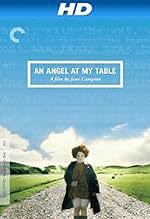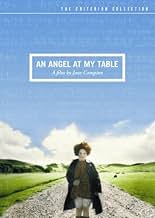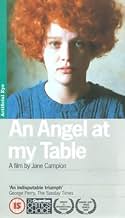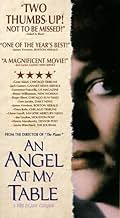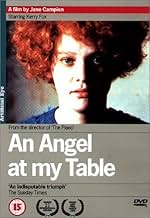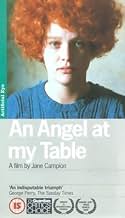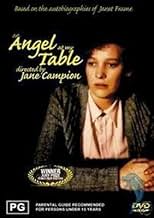NOTE IMDb
7,4/10
8,9 k
MA NOTE
Janet Frame est une enfant brillante jusqu'à ce que, à l'adolescence, elle soit diagnostiquée à tort schizophrène. Explorez la découverte du monde par Janet et sa vie en Europe où ses livres... Tout lireJanet Frame est une enfant brillante jusqu'à ce que, à l'adolescence, elle soit diagnostiquée à tort schizophrène. Explorez la découverte du monde par Janet et sa vie en Europe où ses livres sont publiés avec succès.Janet Frame est une enfant brillante jusqu'à ce que, à l'adolescence, elle soit diagnostiquée à tort schizophrène. Explorez la découverte du monde par Janet et sa vie en Europe où ses livres sont publiés avec succès.
- Récompenses
- 19 victoires et 5 nominations au total
Kevin J. Wilson
- Father
- (as K.J. Wilson)
Histoire
Le saviez-vous
- GaffesThe streets of Ibiza have some features that surely were not present on the 50s, i.e., a "no parking" signal on one of the streets. Cars were very rare on the island those days.
- Bandes originalesSomebody Stole My Gal
Written by Leo Wood
Performed by Pat McMinn with Crombie Murdoch and the Nickelodeons
Used by permission of D.F. Peach
Commentaire à la une
I discovered this incredible film by accident, if there are such things as accidents like this...I saw the title in a movie review book (and a very brief summary) and it intrigued me. Because I knew it was a New Zealand import from years ago, I never even bothered trying to locate a copy. So when it called out to me months later from the shelves in the video shop, I felt eerily compelled to rent it. I watched it by myself in the wee hours of the morning--and it could not have been more ideal.
An Angel at My Table is the story of New Zealand's famous writer, Janet Frame. Fairly long, but never boring, it is told in three 50 minute interludes, taking us through her impoverished childhood, awkward adolescence, and the terrifying and eventually triumphant years that follow: Janet was a plump little girl, with an unruly mop of bright red hair. She was fascinated with books and stories at an early age ~ a friend had lent her a copy of Grimm's which she treasured. A certificate of merit in grade school allowed her the use of the public library where she became even more immersed in literature. Despite financial hardships, her father managed to buy her a journal "for her writings." By her late teens she was no longer plump, but a rather crippling shyness had set in. At social functions she played the wallflower. She preferred to be by herself, where she could nurture her passion for creating stories. She went on to become a teacher (though the idea no longer appealed to her), and suffered a panic attack when a supervisor "sat in" on one of her classes. It was advised that Janet have a psychiatric evaluation--a misdiagnosis of schizophrenia (later changed to nothing more than shyness and depression) landed her in a mental institution for eight years of electric shock therapy, each session she narrated to be: "equal in fear to that of an execution." She was scheduled for a partial lobotomy when news reached her doctors that she had won a national literary award--during her hospitalization her sister had published a book of Janet's short stories. She was almost immediately released under the premise that a talented author couldn't possibly need the treatment she had been receiving....At this point Janet was in her late twenties, but her lengthy "exile" had given the impression that she was considerably younger than that. A friend of the family's, another writer who admired her work, offered her a cottage on his property so that she could write seriously in a distraction-free environment. She accepted the offer and her first completed work there was accepted soon after. European travels were arranged for her, more successful books were born, and fame attained...
I've heard it claimed that Janet had also attained happiness, but I am not sure that I agree. Janet had found numerous freedoms, emotional and financial and of course physical, but happiness? I believe that she had become comfortable with herself, and perhaps that in itself is a happiness. She never did fit into the surrounding world--but lived peacefully alone on the vaporous outskirts. A very supportive therapist in London had told her, "If people tell you that you should go out there and mix, and you don't feel like it,...don't." She took his words to heart.
I was surprised with the overall beauty of this film~I guess I should not have been~the director was Jane Campion (The Piano, Portrait of a Lady). The New Zealand landscapes and backstreets of Spain were gorgeously rendered, the accompanying score at times both capricious and melancholy. But above all, what struck me most, was how I identified with Janet. The plump and impoverished childhood, the obsession with writing, the painful shyness and reclusiveness. The life of the outsider~luckily minus the stay in the psychiatric ward. On some level I was Janet (or am Janet). And there is something oddly redemptive in finding a twin on screen or in a book, however juvenile the notion...
An Angel at My Table is the story of New Zealand's famous writer, Janet Frame. Fairly long, but never boring, it is told in three 50 minute interludes, taking us through her impoverished childhood, awkward adolescence, and the terrifying and eventually triumphant years that follow: Janet was a plump little girl, with an unruly mop of bright red hair. She was fascinated with books and stories at an early age ~ a friend had lent her a copy of Grimm's which she treasured. A certificate of merit in grade school allowed her the use of the public library where she became even more immersed in literature. Despite financial hardships, her father managed to buy her a journal "for her writings." By her late teens she was no longer plump, but a rather crippling shyness had set in. At social functions she played the wallflower. She preferred to be by herself, where she could nurture her passion for creating stories. She went on to become a teacher (though the idea no longer appealed to her), and suffered a panic attack when a supervisor "sat in" on one of her classes. It was advised that Janet have a psychiatric evaluation--a misdiagnosis of schizophrenia (later changed to nothing more than shyness and depression) landed her in a mental institution for eight years of electric shock therapy, each session she narrated to be: "equal in fear to that of an execution." She was scheduled for a partial lobotomy when news reached her doctors that she had won a national literary award--during her hospitalization her sister had published a book of Janet's short stories. She was almost immediately released under the premise that a talented author couldn't possibly need the treatment she had been receiving....At this point Janet was in her late twenties, but her lengthy "exile" had given the impression that she was considerably younger than that. A friend of the family's, another writer who admired her work, offered her a cottage on his property so that she could write seriously in a distraction-free environment. She accepted the offer and her first completed work there was accepted soon after. European travels were arranged for her, more successful books were born, and fame attained...
I've heard it claimed that Janet had also attained happiness, but I am not sure that I agree. Janet had found numerous freedoms, emotional and financial and of course physical, but happiness? I believe that she had become comfortable with herself, and perhaps that in itself is a happiness. She never did fit into the surrounding world--but lived peacefully alone on the vaporous outskirts. A very supportive therapist in London had told her, "If people tell you that you should go out there and mix, and you don't feel like it,...don't." She took his words to heart.
I was surprised with the overall beauty of this film~I guess I should not have been~the director was Jane Campion (The Piano, Portrait of a Lady). The New Zealand landscapes and backstreets of Spain were gorgeously rendered, the accompanying score at times both capricious and melancholy. But above all, what struck me most, was how I identified with Janet. The plump and impoverished childhood, the obsession with writing, the painful shyness and reclusiveness. The life of the outsider~luckily minus the stay in the psychiatric ward. On some level I was Janet (or am Janet). And there is something oddly redemptive in finding a twin on screen or in a book, however juvenile the notion...
Meilleurs choix
Connectez-vous pour évaluer et suivre la liste de favoris afin de recevoir des recommandations personnalisées
- How long is An Angel at My Table?Alimenté par Alexa
Détails
- Date de sortie
- Pays d’origine
- Langues
- Aussi connu sous le nom de
- An Angel at My Table
- Lieux de tournage
- Sociétés de production
- Voir plus de crédits d'entreprise sur IMDbPro
Box-office
- Montant brut aux États-Unis et au Canada
- 1 054 638 $US
- Week-end de sortie aux États-Unis et au Canada
- 12 905 $US
- 27 mai 1991
- Montant brut mondial
- 1 055 995 $US
- Durée2 heures 38 minutes
- Couleur
- Rapport de forme
- 1.66 : 1
Contribuer à cette page
Suggérer une modification ou ajouter du contenu manquant

Lacune principale
By what name was Un ange à ma table (1990) officially released in India in Hindi?
Répondre

